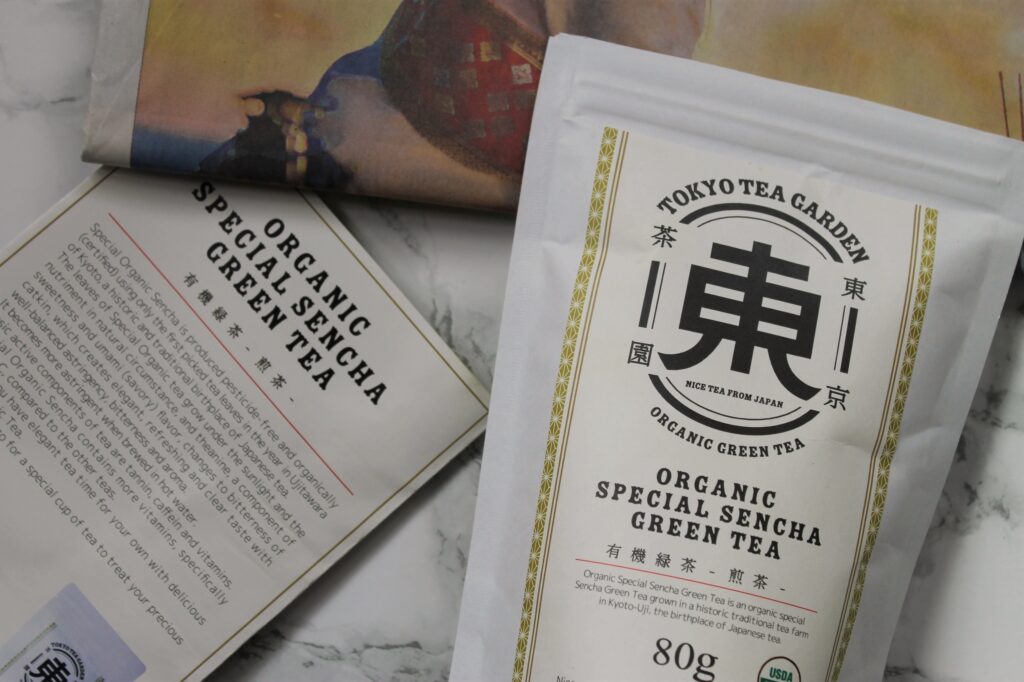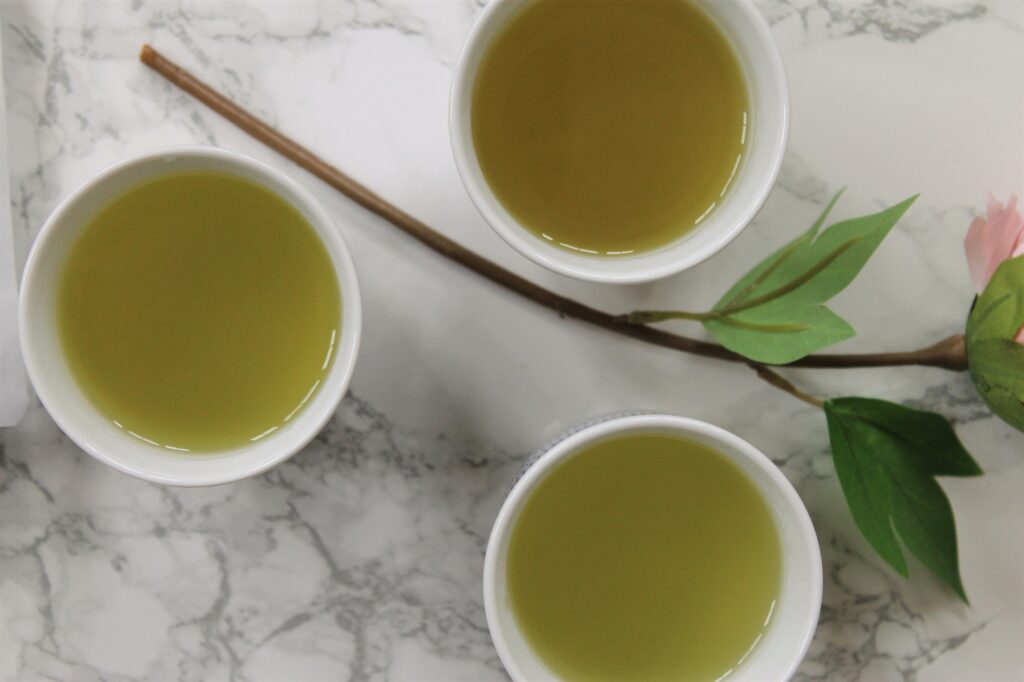Spring is almost here and what better tea to celebrate with than Tokyo Tea Garden Sencha! This special sencha is harvested from the Uji region of Kyoto, Japan, and it has an amazingly vibrant aroma.
In this tea review, I’m going to take you through what this tea tastes like, how best to brew it, and where you can buy it online to try for yourself. As this is a loose leaf tea, you will need a loose leaf brewer or infuser to make a cup – from filters to tea-for-one sets, you can find teaware that I recommend in our Immortal Wordsmith tea shop.
Organic Japanese Sencha at a Glance
- Origins: Sencha from the Ujitawara town in Kansai, the Kyoto prefecture in Japan
- Flavour: Mellow greens and sweetness with strong vegetal notes and light astringency
This is a verdant sencha green tea with a strong aroma and flavour. Astringency is low but still present and a good balance for the intense vegetable sweetness. It’s almost savoury but quite delicious!

Full Review – Tokyo Tea Garden Sencha
- Type: Loose leaf
- Tea: Sencha green tea
- Origin: Ujitawara, Kansai, Kyoto, Japan
- Flavour Notes: Mellow body, fresh greens, sweetness, bright and light astringency
- Aroma: Sweet, freshly mowed grass, nutty, steamed greens, summer cabbage, spinach mangetout
- Milk or Lemon: Neither
- Where to Buy: Tokyo Tea Garden
Tokyo Tea Garden sent me 80g of this tea, which is incredibly generous. As soon as you open the resealable pouch, intense notes of sweetness and greens reach your nose. It is vibrant, pungent, and extremely fresh with a hint of nuts and freshly mowed grass.
Once brewed into a dusty pale yellow-green colour, the aroma develops more depth and presents notes of steamed greens – particularly sweetheart cabbage, spinach, and mangetout. Like fresh peas picked from the garden, this sencha has an incredible vegetal sweetness. I’m not always fond of that savoury vegetable note in green tea, however there’s so much sweetness that I really don’t mind it.
The flavour is just as vibrant and interesting as the aroma. With a mellow and warming body, the tea has a gentle growing sweetness that comes from a mix of grass and vegetable notes. I also appreciated the astringency in this sencha – it’s bright and subtle, but just enough to balance out that sweetness.
With a slick and smooth texture on your tongue, this tea is incredibly refreshing. It’s a little too astringent to drink first thing in the morning (your stomach won’t forgive you) but after a heavy meal, it is perfect.

How to Brew Sencha Green Tea
Sencha green tea needs to be brewed at 80°C or even less, to allow the sweetness to develop and the astringency to remain subtle. If you use water that’s too hot, the tea will be unbearably bitter to drink.
To brew this tea, you should start with a rinse. Place 3g of sencha tea leaves in a teapot or any receptacle for brewing, pour over a good splash of 80°C water and swirl it around for 5 to 10 seconds. Pour this water away, then add 250ml of water for your first steep. Let it brew for 30 seconds then strain into your cup or mug. This might not sound like long, but as I noted in my T2 Sencha Review, a little goes a long way and brewing in 30 second increments is wise.
The rinse opens up the tea leaves and takes away some of that astringency. As a result, that first steep is nice and smooth. After your 30 second brew, you can re-steep the tea leaves multiple times, brewing for a little longer each time.
I would recommend something sticky and filling to eat with this tea. Sushi, pork belly, sticky rice, or any food from your favourite cuisine that has needs a refreshing drink alongside.
Why Tokyo Tea Garden?
Tokyo Tea Garden approached me on Instagram to sample and review their special sencha and their Premium Matcha. I absolutely loved their matcha but I think this sencha might be my favourite! This special sencha is certified organic with USDA, meaning it is grown without pesticides and other nasties.
Sencha is from the first flush of tea in the year, which means this is from the first harvest when the leaves are new, fresh and bright. Furthermore, sencha has higher levels of L-Theanine and astringency, for a brighter and cleaner taste than other green teas. I can certainly attest to that!

Tokyo Tea Garden Sencha comes from Ujitawara, a town in the Kyoto prefecture of Japan. This is considered the birthplace of green tea and it has the perfect climate and growing conditions for producing the highest quality sencha tea leaves.
I have no qualms with the organic certifications of this tea, nor the quality of the tea leaves themselves. Although a few had some brown edges when they unfurled in my cup, overall they were bright and verdant as you would expect.
Summary
This is a delicious and high-quality sencha from the birthplace of Japanese green tea. You receive a very generous amount of tea leaf in the pouch, and I am pleased to report that Tokyo Tea Garden have international shipping on their website. You can browse their range of teas using the button below.

Tea Recommendation
If you would prefer a green tea with a blend of additional flavours, to reduce the vegetal notes and introduce more fruity tastes, I highly recommend Whittard Goji Acai. This green tea earnt a very respectable 3.8 out of 5 in my scoring system and is readily available across the UK in Whittard stores and online.
